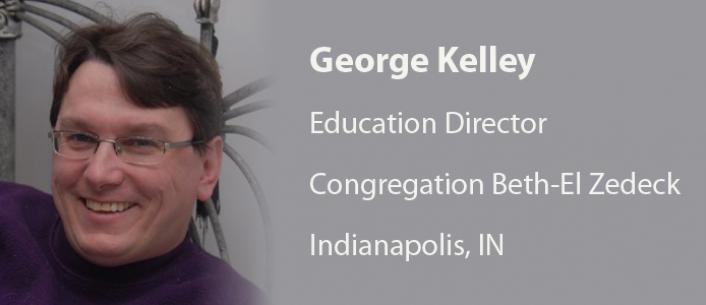- Home
- Play & Learn Home
- Online Enrichment
- Experience Modern Israel
- Israel It's Complicated
- Jewish and Me
- Jewish Holidays Jewish Values
- Jewish Values in Genesis and Jewish Values in Exodus
- Min Ha’aretz
- Our Place in the Universe
- Simply Seder
- The Prophets: Speaking Out for Justice
- Making T'filah Meaningful
- Make, Create, Celebrate
- Yom Haatzmaut Resources
- Hebrew Apps
- About The OLC
- What is the OLC?
- Introduction
- Get Started
- Resources
- OLC Content
- Parent Materials
- See My OLC Classes
- Store
How Education Director George Kelley Does Family Education
Written by Behrman House Staff, 25 of February, 2013
What Do Jewish Families Want?
8 Essential Questions to Guide Students to an Enduring Understanding of Jewish Values
When Jewish Values Collide, Debate in the Classroom Helps Students Explore More Deeply
We recently asked fans of the Behrman House Facebook page "How do you get parents involved in Jewish education and reinforce Jewish life at home?" George Kelley, Education Director at Congregation Beth El-Zedek in Indiana, joined the conversation and offered some great family education ideas. We asked him to expand on his comment here so other educators can learn from Beth El-Zedek's success.
In our congregation, synagogue school is family education, since so often the work we do in the classroom will translate to home, if we are successful. The goal, however, should be on learning as much as teaching. Too often Jewish educators have focused on giving students Jewish answers when it is much better to provide them with the opportunity to create Jewish questions as they move through life.
At Beth-El Zedeck we have created many family education programs that help parents feel comfortable filling in the gaps they missed in their Religious School experiences. Oftentimes our parents are among the brightest in their career field but feel woefully inadequate when it comes to Judaism. We let them see that having the specific answer is not necessary—what matters is creating dialogue and a place for growth. This is an approach that helps make them feel comfortable in learning.
Our highly successful 4th grade option has parents learning along with their children in a Sunday family learning class. Attending together, parents learn from the teachers, each other and their children. Every Sunday is an eye opening experience in Judaism.
One aspect of the parent/child class is the use of drama. We develop skits, for example, about the stories of the holidays. Mostly the children are the actors though some parents choose to get involved. The skit sets the discussion for the class and the parents are reminded of what they might have forgotten or what they may learn from research as the skit is developed.
Another way is playing games. It is surprising how disarming a game is when students and parents work together to answer questions or propose questions as the class divides to work on a team. It creates an atmosphere of learning through social interaction so no one family, child or teacher is responsible for all the knowledge in the room. This way the variety of levels of information among the class seem more leveled allowing the students to learn and parents to feel less intimidated by what they do not know or have forgotten.
We find that when we offer parents an opportunity to participate in their children’s learning experience, while removing any chance of failure due to lack of knowledge, they embrace the challenge.
This translates into other special programs – from Tu B’shevat Seders, to Mezzuzah-making workshops, and a seminar for Bar and Bat Mitzvah families where they explore not the logistics of the ceremony but how the family can build unique meaning for themselves in the process of preparation.
Religious Education cannot be about achieving milestones for individuals where performance takes the lead. It must be about emotion and growth in a family and in a community and finding one’s place in the story of our people.
How do YOU involve families in Jewish education? Read other educator's comments and post your own on Facebook.



